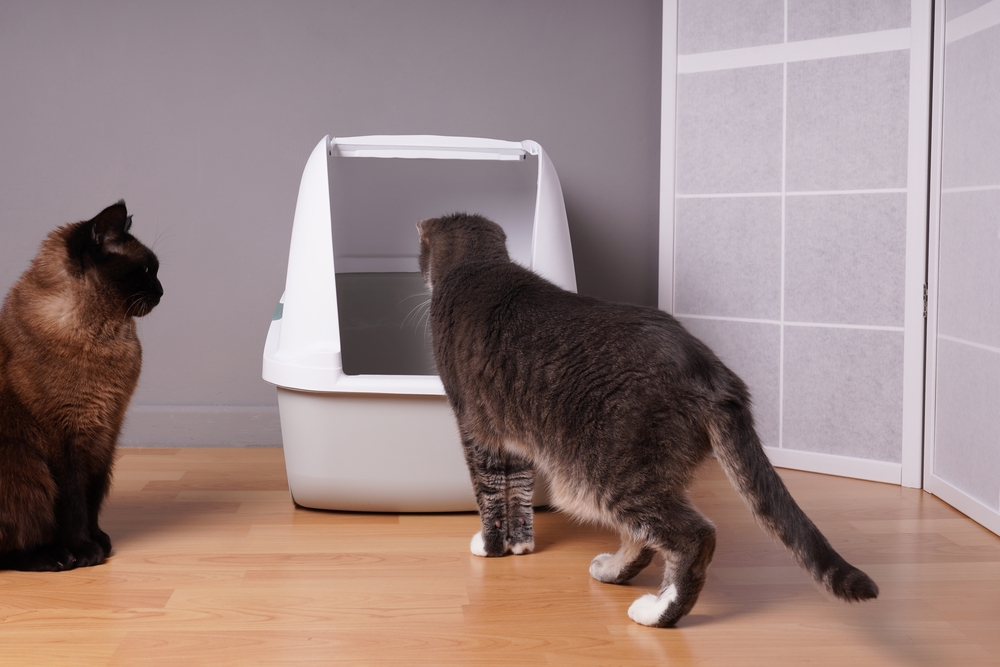The most frustrating part of cat ownership is tangling with litter box issues. Your feline friend may scatter litter over the floor, leave messy paw prints of litter on your bed, or miss the litter box entirely—intentionally or unintentionally.
Discovering puddles of urine or piles of feces is equally as frustrating and irritating. Inappropriate urination issues are a major reason why cats are surrendered to animal shelters, because no one likes frequently cleaning up strong-smelling feline urine. However, cats pee outside their litter boxes for various reasons that usually can be treated with proper management. Finding the root cause for inappropriate urination is key.
Instead of banishing your cat for poor litter box habits, ask yourself why they are peeing outside their box. Chances are, one of the following problems is to blame.
#1: Your cat has a urinary tract problem
Many cat owners immediately think “urinary tract infection” (UTI) when they discover their pet urinating outside the litter box. However, a UTI represents only a small number of feline urinary issues.
If your cat has a urinary issue that is affecting their litter box habits, they may have:
- Feline idiopathic cystitis (FIC) — FIC is the most common cause for inappropriate urination, and can affect any cat, although FIC typically appears more frequently in young adult cats who live a sedentary indoor lifestyle and eat a dry diet. Cats affected with FIC often have flare-ups when they are stressed or ill, and may have difficulty urinating, more frequent urination, and blood in the urine.
- Urinary stones — Spurred by a poor diet, dehydration, or urinary tract infection, urinary stones can develop in any part of the urinary tract, but most commonly in the bladder and urethra. Without surgical removal or dietary dissolution, the stones can completely block urine excretion and lead to a life-threatening emergency, particularly in male cats who have a narrow urethra with a challenging curve.
- Urinary tract infection (UTI) — UTIs are more common in older cats who have concurrent health issues, such as diabetes. Bacterial overgrowth can lead to more frequent urination of small amounts, pain while urinating, and blood in the urine—signs similar to FIC.
#2: Your cat has a medical issue unrelated to their urinary tract
Numerous medical issues—and some treatments—can result in inappropriate urination. Your cat may urinate outside their litter box because of health problems that cause pain, impaired mobility, or excessive thirst and urination. Conditions that may cause your cat to pee in unacceptable spots include:
- Diabetes
- Chronic renal failure
- Liver disease
- Osteoarthritis
- Cognitive dysfunction
- Hyperthyroidism
- Pain associated with declawing
Urination outside the litter box is often your cat’s way of telling you that something is wrong and they need veterinary attention.
#3: Your cat does not approve of their litter box
No one appreciates a dirty toilet, and your cat is no exception. Ideally, litter boxes should be scooped at least twice a day and disinfected weekly to stay fresh. Other reasons why your cat may shy away from their litter box include:
- Litter type — Heavily scented litter may help cover up the odor wafting from your cat’s toilet, but perfume often turns cats away from their litter box. Most cats prefer unscented, fine-particle, clumping litter.
- Box type — If your cat sprays urine or litter, you may opt for a covered litter box to keep their mess contained. However, cats can feel trapped and refuse to use a covered box.
- Box position — You may want to place a litter box in an out-of-the-way room like the laundry, but the dryer’s clanging can freak your cat out and prevent them from eliminating. Choose quiet locations where your cat can use their litter box in peace.
- Other cats — If you have a bullying problem among your household cats, the victim is unlikely to make themself vulnerable in a litter box and will instead seek out a safe place where they can eliminate without feeling trapped or exposed.
- Number of boxes — The American Association of Feline Practitioners (AAFP) recommends that cat owners provide one more litter box than the number of cats in the household. This ensures that each cat can always find an empty box and reduces competition for resources.
#4: Your cat is stressed
Stress causes cats more health issues than many people realize, and can be a primary cause of inappropriate urination. Sensitive felines can experience stress through:
- Inadequate environmental enrichment
- A sedentary lifestyle
- Subpar scratching opportunities
- Abrupt schedule changes
- Home modifications
- New household additions
- Interactions with other pets
- Territory and resource sharing
- Poor litter box hygiene
If you’re constantly on the hunt for your feline friend’s newest urine puddles, call or book online to schedule an appointment with our Shuler Veterinary Clinic team. We can help you get to the bottom of your cat’s litter box avoidance.









Leave A Comment